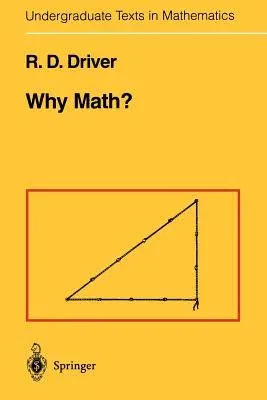R D Driver
(Author)Why Math? (1984. 2nd Printing)Paperback - 1984. 2nd Printing, 19 December 1994

Qty
1
Turbo
Ships in 2 - 3 days
In Stock
Free Delivery
Cash on Delivery
15 Days
Free Returns
Secure Checkout
Part of Series
Undergraduate Texts in Mathematics
Print Length
233 pages
Language
English
Publisher
Springer
Date Published
19 Dec 1994
ISBN-10
0387944273
ISBN-13
9780387944272
Description
Product Details
Author:
Book Edition:
1984. 2nd Printing
Book Format:
Paperback
Country of Origin:
US
Date Published:
19 December 1994
Dimensions:
23.11 x
15.49 x
1.78 cm
ISBN-10:
0387944273
ISBN-13:
9780387944272
Language:
English
Location:
New York, NY
Pages:
233
Publisher:
Weight:
362.87 gm

